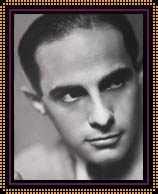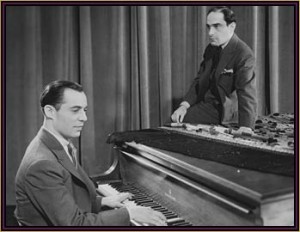 Hart, Lorenz Milton (May 2, 1895 – Nov. 22, 1943), musical comedy lyricist, was born in New York City, the elder of two sons of Max M. and Frieda (Isenberg) Hart. Of Jewish background, he traced his descent through his mother from the German poet Heinrich Heine. His father, a business promoter, was sufficiently prosperous to enable Lorenz, after preparation at two private schools, to spend two years (1914-16) at the School of Journalism of Columbia University. Reared in a worldly, bibulous home, temperamentally alienated from a rather coarse-grained father, indifferent to academic studies outside literature and drama, Hart was perhaps even more than Cole Porter the expressive bard of the urban generation which matured during the interwar years 1919-41. Much of his work — slick, breezy, and yet mordant, even morbid — reflects their tart disillusion. A bachelor living with his widowed mother, whom he once described as a “sweet, menacing old lady,” he was a restless world traveler and, especially after his mother’s death, an alcoholic who disappeared for weeks on end to escape a life periodically unbearable. But with all his moody unreliability he found his destiny as lyricist to his more stable friend Richard Rodgers.
Hart, Lorenz Milton (May 2, 1895 – Nov. 22, 1943), musical comedy lyricist, was born in New York City, the elder of two sons of Max M. and Frieda (Isenberg) Hart. Of Jewish background, he traced his descent through his mother from the German poet Heinrich Heine. His father, a business promoter, was sufficiently prosperous to enable Lorenz, after preparation at two private schools, to spend two years (1914-16) at the School of Journalism of Columbia University. Reared in a worldly, bibulous home, temperamentally alienated from a rather coarse-grained father, indifferent to academic studies outside literature and drama, Hart was perhaps even more than Cole Porter the expressive bard of the urban generation which matured during the interwar years 1919-41. Much of his work — slick, breezy, and yet mordant, even morbid — reflects their tart disillusion. A bachelor living with his widowed mother, whom he once described as a “sweet, menacing old lady,” he was a restless world traveler and, especially after his mother’s death, an alcoholic who disappeared for weeks on end to escape a life periodically unbearable. But with all his moody unreliability he found his destiny as lyricist to his more stable friend Richard Rodgers.
Lorenz Hart
- "Babes in Arms"
- "Connecticut Yankee"
- "By Jupiter"
- "The Garrick Gaieties"
- "On Your Toes"
- "Pal Joey"
- Gene Kelly
- Kitty Carlisle Hart
- Richard Rodgers
- Elaine Stritch
- Jule Styne
- Shubert Brothers
With personal growth, with changing times, Hart’s range broadened and deepened. In the 1920s he was insouciant: “The Girl Friend” (“The Girl Friend,” 1926), “Manhattan” (“Garrick Gaieties”), “Thou Swell” (“A Connecticut Yankee,” 1927), “You Took Advantage of Me” (“Present Arms,” 1928). In the 1930s, while he developed his satirical vein (“I’d Rather Be Right,” 1937, was a take-off on politics), he was more sober, even somber, with an almost despairing melancholy. In “Little Girl Blue” (“Jumbo,” 1935) a woman — ironically, girl no longer — sings, “Sit there and count your fingers, … Old girl, you’re through”; in “Spring Is Here … I Hear” (“I Married an Angel,” 1938), the caustic wordplay again evokes a depression-ridden urban world of unmarried adults in lonely, loveless rooms.
Not all was harsh: an etherealized tenderness, an almost desperate romanticism typical of the 1930s suffused “Have You Met Miss Jones?” and the title song from “I’d Rather Be Right,” “The Most Beautiful Girl in the World” and “My Romance” (both from “Jumbo”), “Where or When” (“Babes in Arms,” 1937), the title song from “I Married an Angel,” and “Falling in Love with Love” (“The Boys from Syracuse,” 1938). “Syracuse,” based on “A Comedy of Errors,” was the pioneer adaptation of Shakespeare for musical comedy. If these songs were delicately oblique enough to suit a post-Victorian generation still afraid to pursue hedonism too far or at least too openly, sentimentality still did not eliminate realism: Hart fused the two in a poignant tribute to a homely lover, “My Funny Valentine” (“Babes in Arms”).

Richard Rodgers and Lorenz Hart began their successful collaboration in 1918.
By 1940 Hart and Rodgers had decided that more of the naturalism of contemporary literature and drama must come to musical comedy. In collaborating with John O’Hara on an adaptation of his novel PAL JOEY, they were somewhat in advance of a public reluctant to accept the possibility that nice-looking, lithe young white song-and-dance men could fornicate with and leech upon women. Joey did both. Most of the numbers were harshly witty. An older woman, despoiled by Joey, sings to the ingenue, “Take him, but don’t ever let him take you.” Received with mixed response, “Joey” was revived for enthusiastic audiences a decade later. Similar sarcasm pervaded “By Jupiter” (1942).
When wartime came, Hart was out of step with a patriotic public absorbed with traditional American values. The folksy “Oklahoma!” — that hearty slice of rural Americana conceived by Rodgers — held no interest for Hart, now immersed in cheap midtown Manhattan bars, and Rodgers turned for lyrics to Oscar Hammerstein II. Hart returned to collaboration with Rodgers on a 1943 revival of “A Connecticut Yankee.” On opening night, acting strangely, he slipped away and vanished for two days. Found ill in a hotel room, he was rushed to a New York City hospital, where he died three days later of pneumonia. He was buried in Mount Zion Cemetery, Maspeth, Queens. His brother Teddy, a musical comedy star, was his sole survivor.
A student of literature and an inveterate playgoer from childhood, Lorenz Hart contributed to musical comedies sharp, tasteful lyrics finely coordinated with rhythm and melody and with the plot, mood, and action of the play. Although lyrical fashions moved away from his pungent colloquialism with the banalities of the 1950s and the “hip” polemics of the 1960s, Hart brought into the mainstream of songwriting a conversational directness like Ernest Hemingway’s which eliminated strained poetic diction and bathos. If much of his work seemed precious to a more earnest later generation, not so the biting criticism of urban life implied in “The Lady Is a Tramp” (“Babes in Arms”).
— Hughson Mooney
Source: Excerpted from the DICTIONARY OF AMERICAN BIOGRAPHY, SUPPLEMENT 3: 1941-1945. American Council of Learned Societies, 1973. Reprinted by permission of the American Council of Learned Societies.
Photo credits: Photofest and the Library of Congress

